A great deal of fuss has been made over Ajax Amsterdam’s success in the Champions League this season; compared to PSV Eindhoven, who’ve been drawn in a difficult group, Erik ten Hag’s side has exceeded expectations. Yet the Dutch Eredivisie table hasn’t reflected this narrative, as last year’s champions remain on top with a perfect record through ten match weeks. Hirving Lozano has caught the attention of fans worldwide, but young Dutch winger Steven Bergwijn is an integral member of a direct, smart attack spearheading the Netherland’s best domestic side.
Steven Bergwijn: Why You Should Know Him
At 21 years of age, Steven Bergwijn has already made nearly 100 senior appearances for PSV. His reputation morphed from that of a promising youngster to a genuine star-status last season. Bergwijn is a member of a vibrant group of young Dutchmen ready to improve the Oranje after years of failure. It is not outrageous to imagine the Amsterdam-born attacker – draped in orange — linking up with Memphis Depay for years to come. Nor would it be outlandish to predict a transfer of €25 million or more in Bergwijn’s near future.
But for fans of teams linked with Bergwijn, a move away from Eindhoven may only be a pipedream for now. He recently penned a contract extension with PSV until 2022 and, with Lozano likely to move within the next year, the Dutch champions will do everything in their power to keep him at Phillips Stadion. Bergwijn has already asserted himself as one of the Eredivisie’s best wingers and he will surely be broadcast on televisions worldwide soon enough.
Role on the Pitch
Up front, PSV coach Mark van Bommel has in his possession two phenomenal right-footed wingers. Under Philip Cocu, Lozano and Bergwijn often alternated positions from week-to-week, or even during a match itself. This trend has continued under Van Bommel; Bergwijn has split his time between the right and left flank this season. The goals and assists have remained consistent whichever side he’s on, which could explain the similarities in his game when on the left and right wing.
While on the left, Bergwijn acts a lot like an inverted-winger as he attempts to cut inside and create space. Because PSV will often find counter-attacking opportunities, he is frequently given the space to move centrally and dribble at an out-gunned defence. Bergwijn may start out in a wide position, often to avoid congestion in the midfield, but his ultimate goal is to attack the top of the box. With his first choice to cut inside when on the left wing, Bergwijn accumulates a lot of dribble attempts per match (something that will be touched upon later) and succeeds quite often.
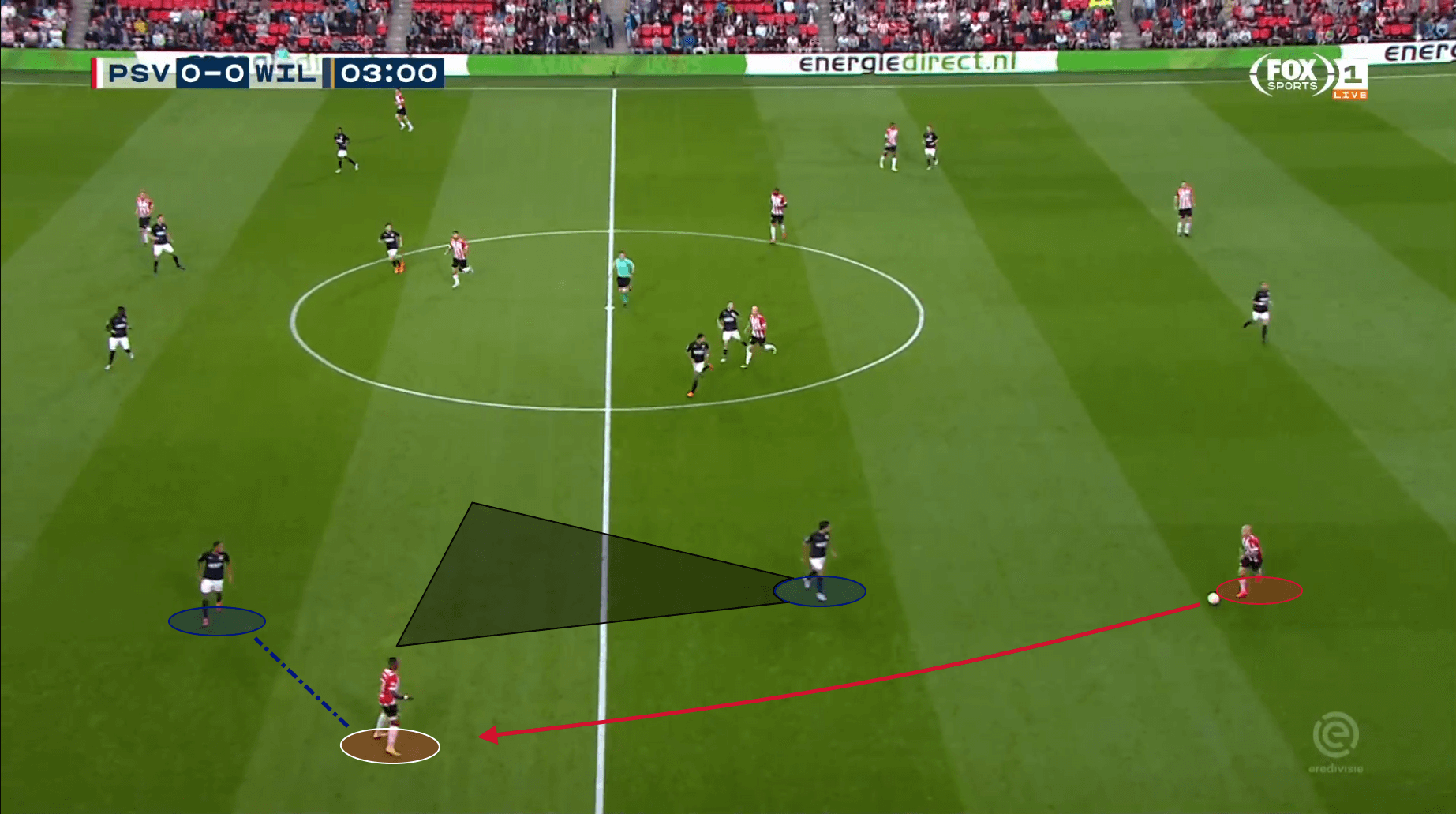
Steven Bergwijn’s play style on the right flank is not what you would call “traditional” wing play. Unlike his teammate Hirving Lozano, Bergwijn sticks to his usual self when out of his natural position. Cutting inside is still the main priority over dribbling to the byline. This speaks to the most prevalent and most important aspect of the Dutchman’s skill set: his ability to take on the opponent.
First Touch and Dribbling
Steven Bergwijn is clearly a gifted footballer; that much is obvious from only a few minutes of game footage. Lengthy compilations could be made of his perfectly-executed first touches and even more of his quick side-steps to fashion space. In tandem, Bergwijn’s close control and quick feet spell danger for defenders looking to impede his progress.
A clean, closely-held first touch is absolutely crucial when operating in congested spaces on the football pitch. Bergwijn is one of the best in the Eredivisie at taking a pass in stride before jolting towards the box. Although he is athletic and quick, Steven is perhaps not the quickest when it comes to pure fast-twitch muscle speed (unlike Lozano, who is blisteringly fast). While Bergwijn is not impeded by his speed on the ball, having a great touch makes up for a lot of the problems that occur when he can’t quite beat an opponent with pure speed.
Although the PSV man will partake in the occasional run from deep, most of Bergwijn’s dribbling happens in the final third. Higher up the pitch, the margin for error is greater as him losing the ball doesn’t immediately spell danger for his teammates. What this means for his dribbling style is that it is perhaps more adventurous than that of a midfielder – he sometimes lets the ball stray too far from his feet or runs at a cluster of defenders well-positioned to tackle Bergwijn. Overall, though, it does seem like this style works well for him and is effective in creating space for chances.
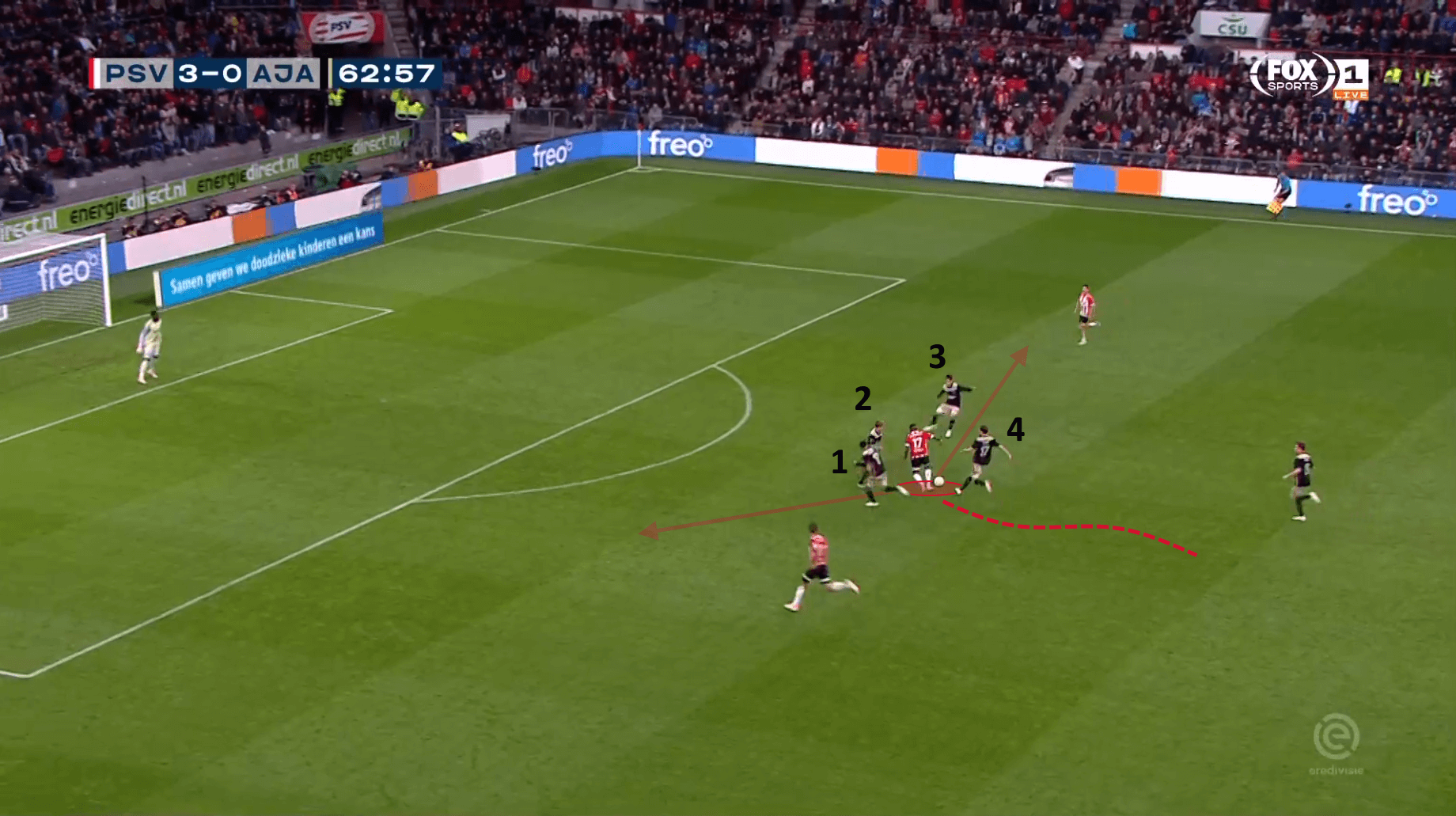
This season, Steven Bergwijn has been one of the best dribblers in the league. When compared to other elite Eredivisie wingers, Bergwijn has one of the highest frequency of dribble success, nearly 70%, and an impressive usage rate of nearly 5 total dribbles per match (WhoScored). The vibrant forward takes a lot of defenders on with a dribble and he succeeds at a high clip.
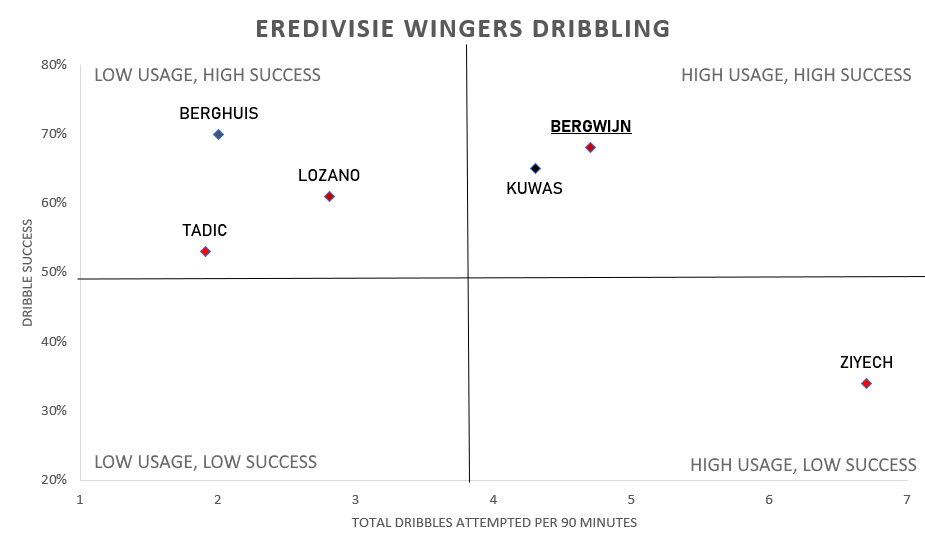
Buildup
PSV are perhaps the most versatile team in the Netherlands when it comes to tactics. Although they became known for their scrappy last-minute winners and ability to grind out a victory during their campaign last season, PSV can just as easily play with a healthy, methodical build-up sequence from the defence. While the double-pivot of Jorrit Hendrix Pablo Rosario is crucial in this respect, Bergwijn will often show himself as a passing option out of the back.
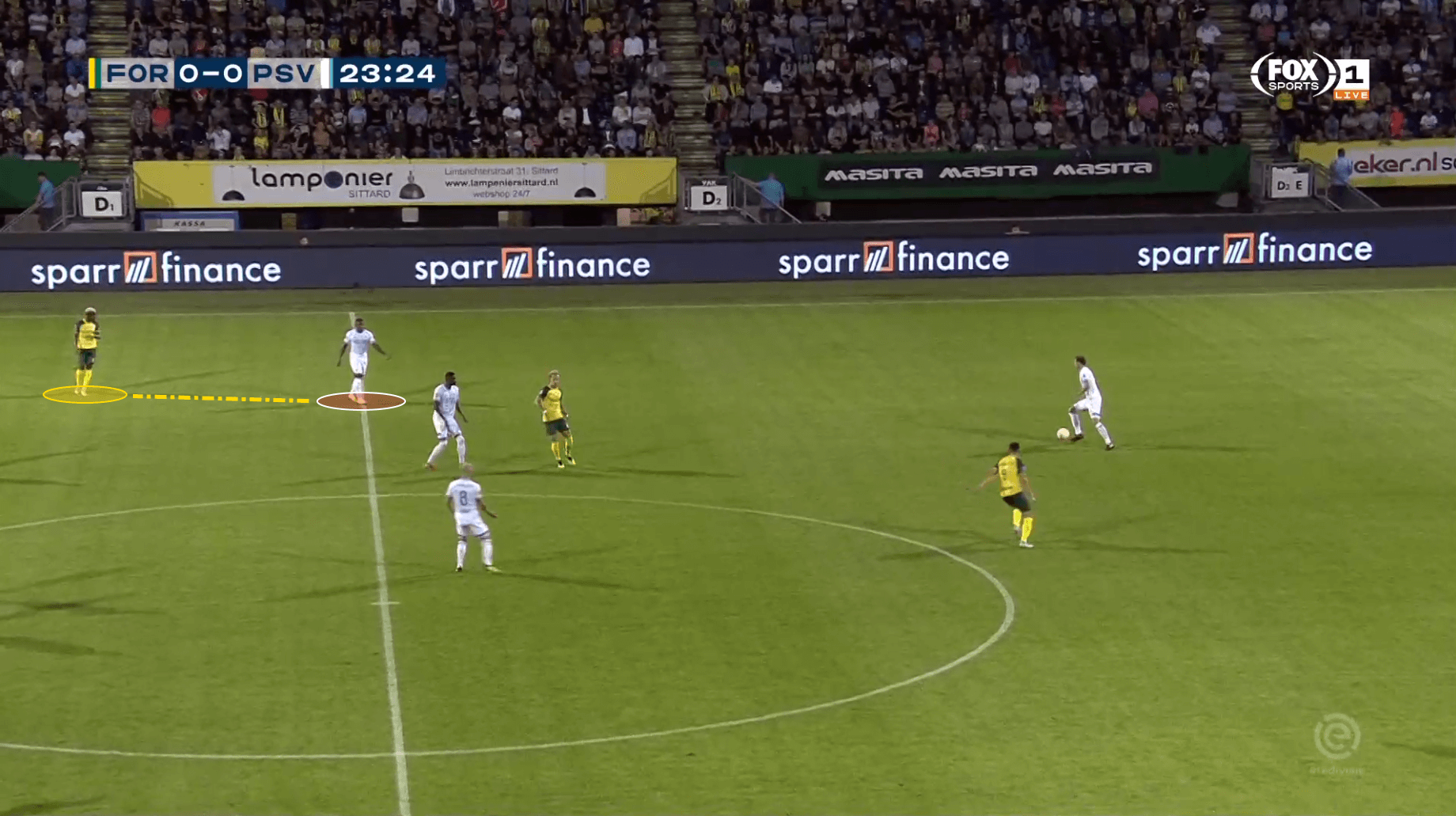
Playing in the midfield is not Steven Bergwijn’s strength, but when given space the winger can use it efficiently. As mentioned previously, his technical ability rivals some of the league’s best. When under pressure in the middle of the park, Bergwijn can be trusted to keep hold of possession before progressing the ball. I do believe that Bergwijn truly shines when given space to dribble at defenders, but his skill set is also suited to aid PSV during their build-up phase.
A substantial weakness in Bergwijn’s game manifests itself more in the middle of the pitch than the final third: passing. He is perfectly adept at pulling off a simple pass, or even a lovely through-ball every so often, but the more difficult passes will often go astray. An 83% pass completion rating is, for a winger, pretty darn good, but a majority of these passes are not as difficult as those that some of Bergwijn’s more creative teammates attempt.
Final Third Creativity
Bergwijn’s pure skill when dribbling on the wing translates to success when controlling the ball in the final phase of play. When running towards the box at speed, the young man is almost unstoppable. His sense of balance and lightning-quick footwork sees the ball appear before the defender one second, and the next thing you know he’s already dragged the ball elsewhere.
What makes Bergwijn’s dribbling style so effective in the final third is that it’s not geared towards creating massive amounts of space. For example, midfielders like Frenkie de Jong use body feints and fast acceleration to breeze past opponents and progress the ball quickly and efficiently. Bergwijn can do this, to a degree, but most often his final dribble move is a quick horizontal cut-back. This gives him space to pass or shoot, but not enough to successfully breeze past an opponent.
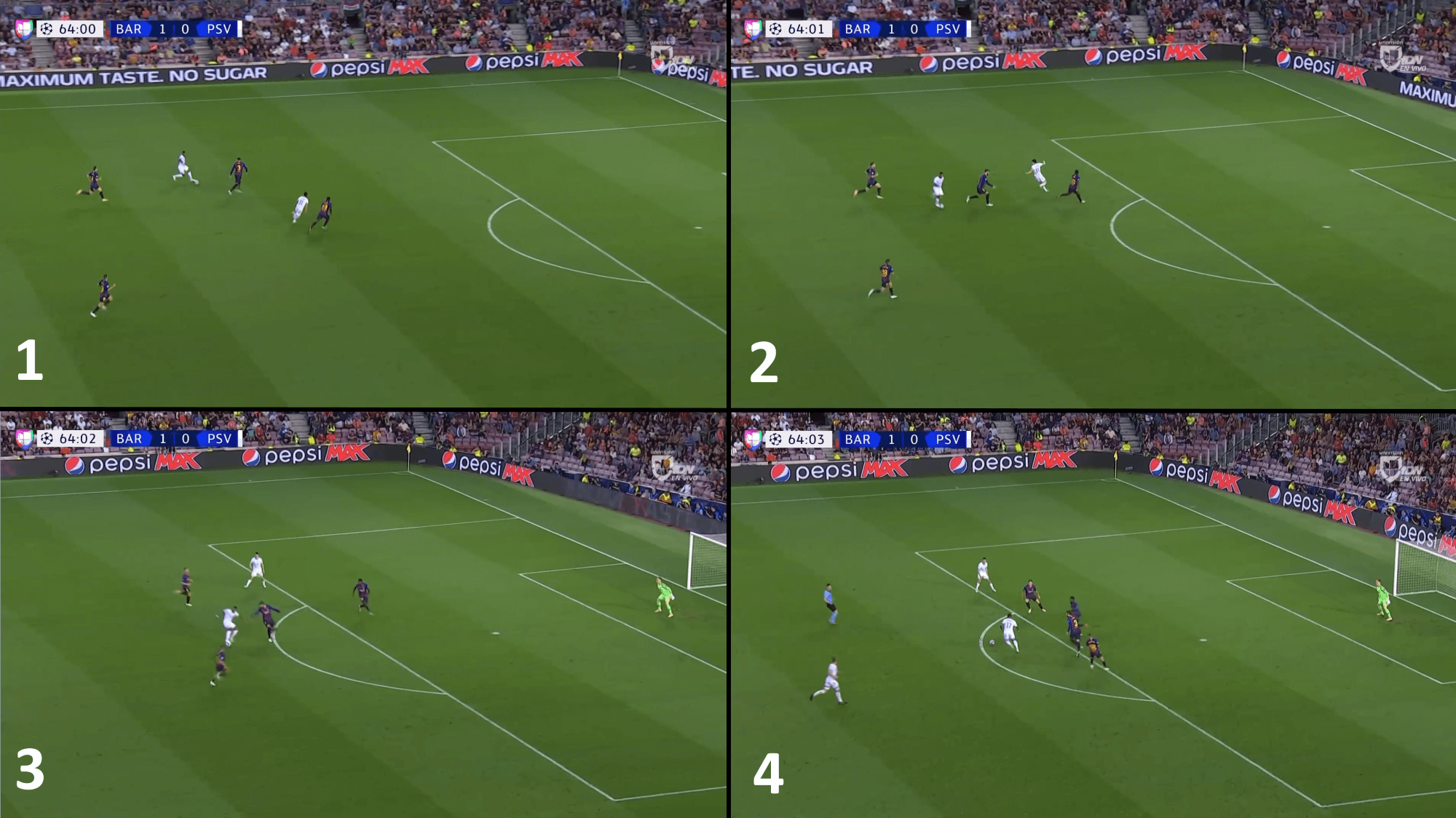
A hindrance, and perhaps the only major one, to Bergwijn’s game is his one-footedness. More so than most elite wide men, he favours his right foot a lot when it comes to passing and shooting. Bergwijn successfully carves out a yard of space when taking on Barcelona‘s Gerard Piqué in the picture above, but he decides not to shoot with his left foot and instead passes out wide. In fact, 86% of the PSV winger’s shots come with his right foot. This is a hindrance in the sense that Bergwijn’s options are limited in the final third because he must get on his right foot before passing or shooting, but also in the sense that opponents can shade him to one side.
However, Bergwijn’s pure skill and quickness on the ball can make up for his one-footedness a great deal. There’s nothing an Eredivisie defender would fear more than the stocky, youthful winger barreling down on him 1v1, perhaps with Lozano and David Neres being the exceptions. Bergwijn has a unique flair as well, making him somewhat unpredictable on the ball. You know he’s trying to get on his right foot, but you don’t know exactly how he’s going to do it.
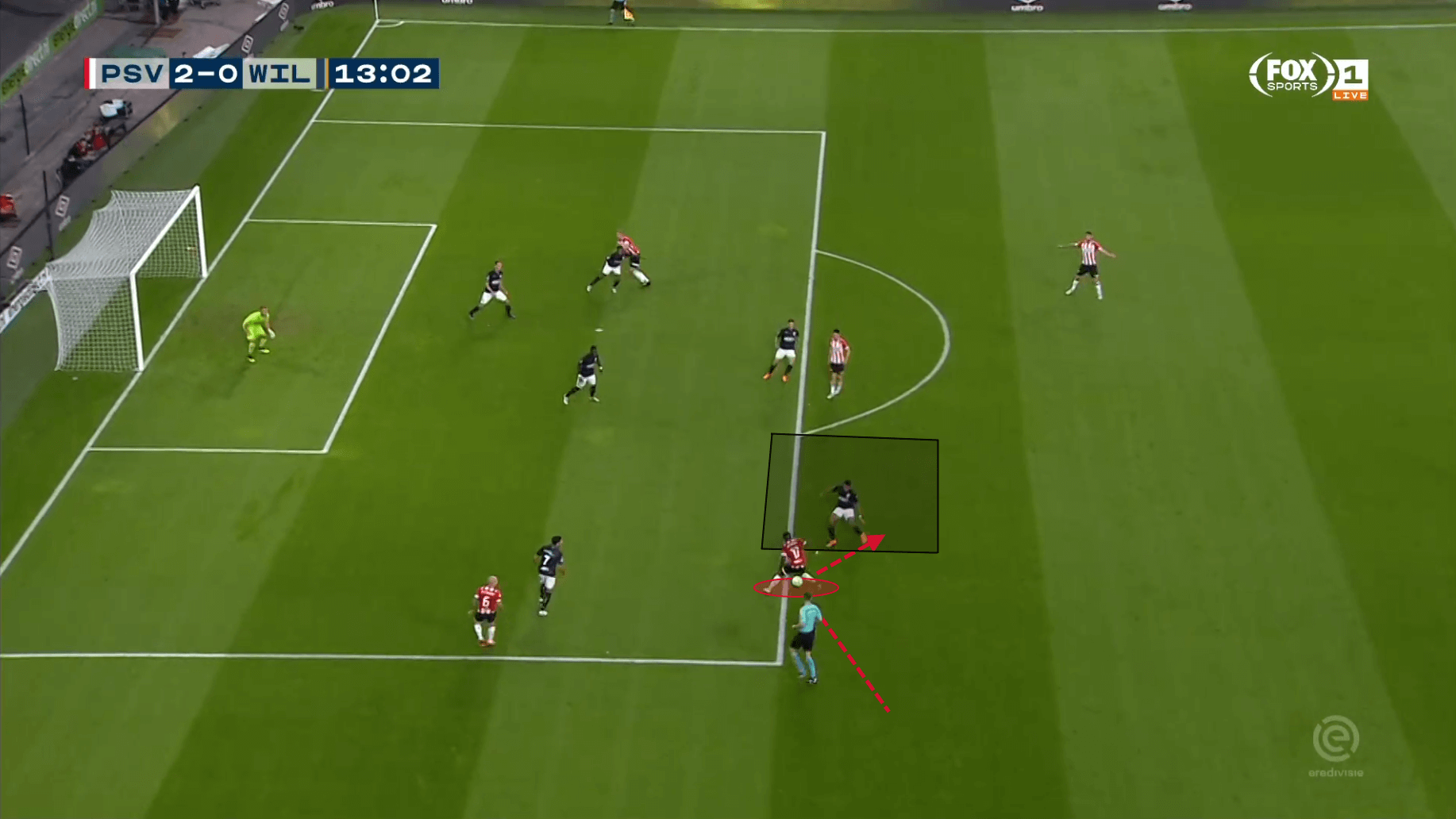
Translatability
In conclusion, Steven Bergwijn is one of the most exciting attacking players in this very promising class of young Eredivisie stars. But will he be able to succeed at a higher level? We know how efficient he is against domestic competition, but the talent gap between the Dutch league and others has for years been explored as a problem point regarding player scouting.
For a start, Bergwijn ticks most of the boxes when thinking of a winger with high potential. He is quick, has great dribbling skill, and is able to create space at the top of the box for a shot or pass. On the downside, he is limited by his one-footedness and he hasn’t proven himself to be great at consistently picking out a killer ball. However, when playing in a side like PSV – one that affords its attackers time and space to isolate themselves with defenders – Bergwijn will always have a chance to succeed.
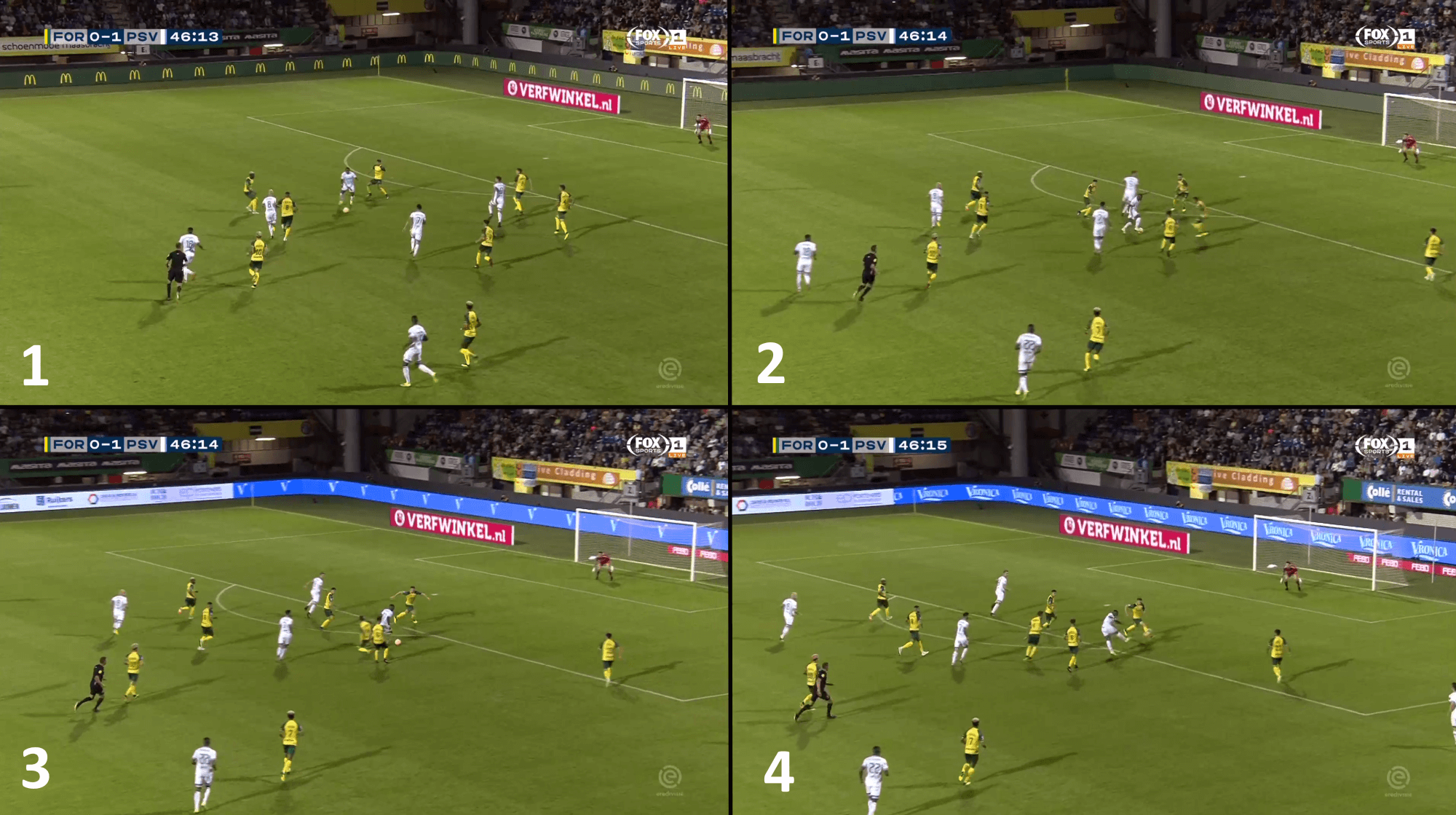
PSV Eindhoven have had a blistering start to the league campaign. Steven Bergwijn has been a huge part of this success, and his exploits out wide have garnered attention from some of Europe’s largest clubs. The 21-year-old is already one of the league’s best, and if Lozano decides to leave PSV in January or next summer, Bergwijn has the ability to take on the burden of being the side’s main attacking threat.
Need more Dutch football to sink your teeth into? Read our tactical analysis of Ajax’s Champions League win over Benfica.

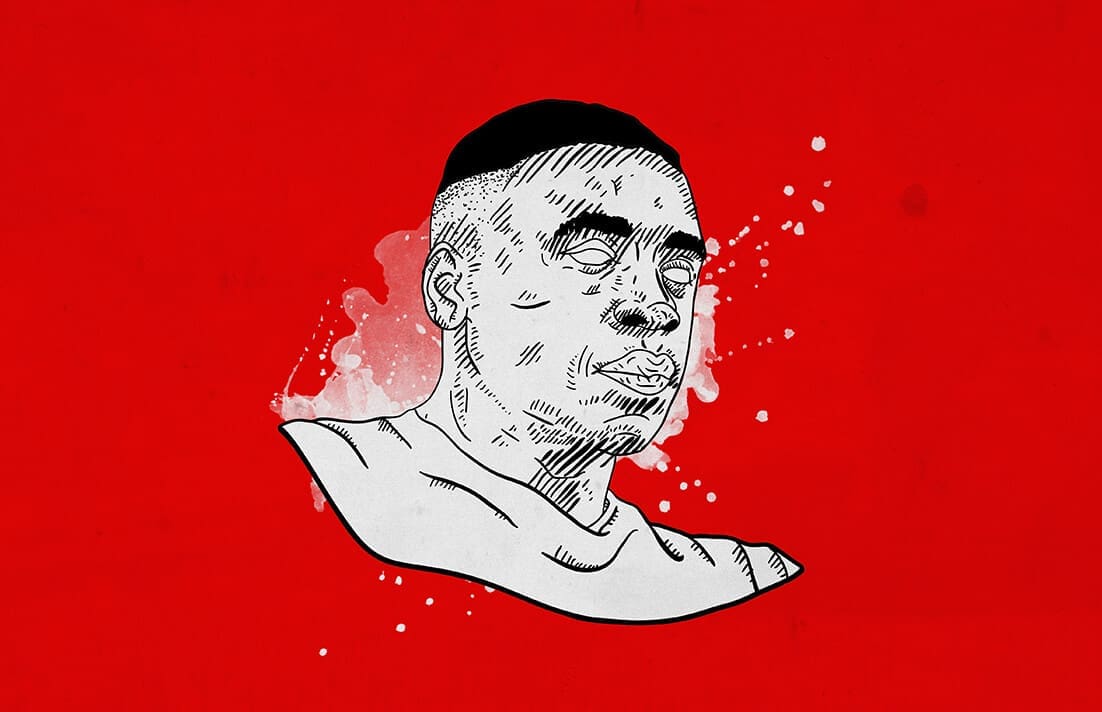



Comments